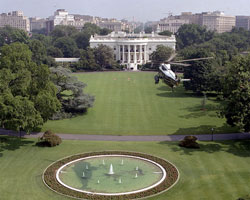
Top stories






More news


Marketing & Media
Ads are coming to AI. Does that really have to be such a bad thing?














Sometimes censorship provokes a wonderful, creative response. And last week was one of those times. The attempt to ban pictures of the presidential hideaway in Nkandla led to a flurry of imaginative and hilarious responses.
Writer Tom Eaton tweeted a picture of Versailles: "Let's just use this," he said. "Same ideology behind it, same poverty outside". Journalist Max du Preez's Facebook picture of the president's private residence was shared 1,600 times. Cartoonist Jerm drew a map of Nkandla in the style of Asterix's fortress in Gaul: "The year is 2013 AD and all Nkandla is occupied. All? No, one huge compound of indomitable Zulus holds out against the concerned taxpayers."
Someone else pasted the picture into a South African Revenue Service advertisement: "Thank you South Africa. Your tax is touching lives." Activist Zackie Achmat tweeted the pic with a call to arms: "Yes. We must. Break unjust laws." The Economic Freedom Forum started the hashtag #ShareAnkandlaPicture. The main #nkandla hashtag trended for about 24 hours.
Someone blacked out the buildings in the picture, reminiscent of the blank spaces and black lines of the 1980s. Cleo Fitzgerald of Durban used Smurf images to block the details. Justice Malala called it: "The gift that keeps on giving."
Katy Katopodis of Eyewitness News suggested that if you put an Nkandla picture on your car, it will be illegal for the e-tolling gantries to take a picture of it, and you could drive through unhindered.
And that was just on Twitter, which had effectively defeated the attempt at censorship within minutes. More remarkable was the way the mainstream media followed. Twenty years ago, an "alternative" newspaper might have defied a censorship law, most newspapers would have stood aside and tut-tutted, and the Afrikaans press would probably have condemned any breach of the government diktat. This time it was reversed. The Times ran the photo with the ultimate nose-thumbing: "So, arrest us." The Star said: "Look away! What Minister Cele does not want you to see." Beeld shouted "Die verbode foto (The forbidden photo)". City Press ran an annotated map of the sprawling complex. "This is how the media toyi-toyis," someone tweeted.
By the time it got to the Mail & Guardian at the end of the week, the paper that would have led defiance a couple of decades ago, there was little more to do. South African newspapers, it seems, have changed, just not in the way the government anticipated.
Even the South African National Editors' Forum said it would not abide by the warning not to publish the photos, pointing out that to accept this ruling would mean no more pictures of the Union Buildings or Parliament.
The attempt at censorship had been defeated, the government had backtracked (blaming the media on the way for "misconstruing" a Cabinet directive) and lawyers had added some sanity. Media expert Dario Milo pointed out that the law did not allow for a blanket ban on the pictures, just those that would endanger security. He highlighted the fact that there were still a number of apartheid censorship laws still in place, and little government action to remove or update them. The incident also showed why one needed a public interest defence for journalists: allowing them to do risky stuff if they could show there was clear public interest.
The overall effect was to draw more attention to the president's folly than ever. More than that, though, it showed that censorship has become impossible to sustain. Of course, it is different in countries such as Ethiopia, where - with seven journalists in prison, some serving 20-year sentences - there is real fear to give weight to threats.
But once the fear goes, censorship cannot last. Here we saw a triumph of the human spirit, of the love of freedom, over the dull-witted, grey securocrats who feel their job is to give political - and not just security - protection to the president.
